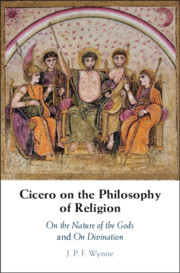Book contents
- Cicero on the Philosophy of Religion
- Cicero on the Philosophy of Religion
- Copyright page
- Dedication
- Contents
- Acknowledgments
- Abbreviations
- Introduction: Cicero and the Translation of Philosophy from Greece to Rome
- Chapter 1 Cicero’s Project in On the Nature of the Gods and On Divination
- Chapter 2 Velleius the Epicurean
- Chapter 3 Balbus the Stoic and Cotta the Skeptic
- Chapter 4 Quintus’ Stoic Case for Divination
- Chapter 5 Marcus’ Arguments against Divination
- Chapter 6 Marcus’ Stance on the Central Question
- Book part
- Bibliography
- General index
- Index locorum antiquorum
Chapter 4 - Quintus’ Stoic Case for Divination
Published online by Cambridge University Press: 27 September 2019
- Cicero on the Philosophy of Religion
- Cicero on the Philosophy of Religion
- Copyright page
- Dedication
- Contents
- Acknowledgments
- Abbreviations
- Introduction: Cicero and the Translation of Philosophy from Greece to Rome
- Chapter 1 Cicero’s Project in On the Nature of the Gods and On Divination
- Chapter 2 Velleius the Epicurean
- Chapter 3 Balbus the Stoic and Cotta the Skeptic
- Chapter 4 Quintus’ Stoic Case for Divination
- Chapter 5 Marcus’ Arguments against Divination
- Chapter 6 Marcus’ Stance on the Central Question
- Book part
- Bibliography
- General index
- Index locorum antiquorum
Summary
In Book 1 of On divination, Cicero’s brother Quintus, who is not a Stoic, presents the Stoic case that all the many forms of divination at Rome are channels of divine communication. He does so explicitly in response to the arguments of On the nature of the gods, to strengthen the case that the gods care for us. I argue that his speech, which scholars have often called confused, can be better understood once we see it as a continuation of On the nature of the gods. For he speaks about not the, or even one, Stoic defence of divination, but rather two different Stoic views. The first is the view of Chrysippus, according to which divination was an art of interpreting messages from the gods. This view was challenged by the skeptic Carneades, and Cotta reissued some of this challenge in On the nature of the gods. Quintus recruits a new view in answer to this challenge, according to which some divination (e.g. augury, haruspicy, astrology) is artificial in that its divination meaning is first discovered by an art, but some is natural, in that some dreams and oracles have divinatory meaning without the use of an art.
- Type
- Chapter
- Information
- Cicero on the Philosophy of Religion<I>On the Nature of the Gods and On Divination</I>, pp. 182 - 221Publisher: Cambridge University PressPrint publication year: 2019



